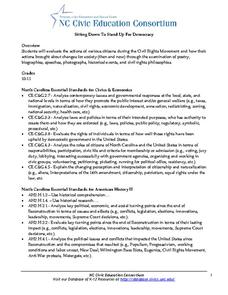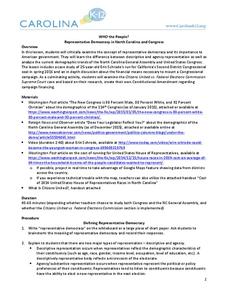Facing History and Ourselves
Defining Democracy
For democracies, it is both the best and the worst of times. As part of a study of the challenges facing democracies, young political scientists seek first to define democracy, and then to consider the relationship between democracy and...
Constitutional Rights Foundation
What Is Constitutional Democracy?
Rediscover the values at the heart of American democracy and what makes it unique with your pupils. Use a reading and discussion questions—in addition to an analytical activity—on the preamble to the Constitution. An additional activity...
Carolina K-12
Doing Democracy
How do you explain democracy to a middle school classroom? A social studies resource breaks elections and the democratic process down for your class. Discussion questions, worksheets, activities that build critical thinking skills, and a...
Pace University
Jacksonian Democracy
Jacksonian Democracy ... a total success or a complete failure? Young academics examine Jacksonian Democracy, including the concept of the supremacy of the federal government and the forced relocation of Native Americans. Scholars...
Museum of Tolerance
The Pursuit of Democracy and Diversity: The Trial of Pro-Social Injustice in Historical Documents and Accounts
Class members investigate The Indian Removal Act of 1830, U.S. Theft of Mexican Territory Timeline, and President Abraham Lincoln’s letter to Horace Greeley, 1862, and then conduct a mock trial of each of these documents to determine...
Facing History and Ourselves
Insights on Democracy from South Africa
As part of their study of democracy, high schoolers listen to a podcast featuring two South African educators and their efforts to support the process of transforming the nation from apartheid rule into a democracy. Learners also read...
Facing History and Ourselves
Literature and Imagination Make Democracy Work
The final lesson in the "What Makes Democracy Work?" series examines the connections between imagination, literature, and democracy. Class members listen to a podcast, read an excerpt from Azar Nafisi's, The Republic of Imagination, and...
Facing History and Ourselves
Citizen Power Makes Democracy Work
Eric Liu's formula "power plus character equals citizenship" and his three strategies to making change happen model for high schoolers how to develop citizen power, how to get involved and participate to make democracy work. Class...
Facing History and Ourselves
Responding to Difference in Democracy
Disagreements happen in a diverse democracy. It's what people do about these differences in a diverse society that the resource models. After listening to an eight-minute podcast about a woman who collaborated with people who have very...
PBS
Democracy in Action: Freedom Riders
This is a must-have resource for every social studies teacher covering the civil rights movement. Through an engaging video and detailed viewing guide, young historians learn about the Freedom Riders, and discover how everyday...
Museum of Tolerance
The Role of Citizens in a Participatory Democracy
Groups research participatory democracies and compare the role and rights of citizens in ancient history with those in recent U.S. history. Guided by a series of questions, individuals compose a persuasive essay in which they discuss the...
Facing History and Ourselves
Free Press Makes Democracy Work
A unit study of the importance of a free press in a democracy begins with class members listening to a podcast featuring two journalists, one from a United States public radio station and one from Capetown, South Africa. The lesson,...
Constitutional Rights Foundation
Puritan Massachusetts: Theocracy or Democracy?
Was Puritan society governed as more of a theocracy or democracy? After comparing and contrasting a series of primary source documents, middle and high schoolers form small groups and debate the question.
BBC
Local Democracy
Expanding our students' understanding of government at a local level is a great way to build an understanding of government at a global level. Start the understanding by using any of these fun teaching ideas. Learners engage in several...
Core Knowledge Foundation
Early Presidents and Social Reformers
A unit by Core Knowledge begins with information about early United States presidents. Pupils then explore social reformers such as Sojourner Truth and Frederick Douglas, abolitionism, women's rights, and more. Participants listen and...
University of North Carolina
Sitting Down To Stand Up For Democracy
Boycotts and bus rides, sit-ins and speeches. The focus of this amazing resource is on those people who were willing to put themselves at risk to take a stand for their belief in equal rights for all. A must-have for your curriculum...
City University of New York
Women's Suffrage and World War I
Democracy cannot exist where not everyone has equal rights. Discuss the state of democracy and women's suffrage during World War I with class discussions, debates, and primary source analysis, in order for class members to connect with...
Facing History and Ourselves
Interracial Democracy
Radical Reconstruction, the 10-year period referred to after Congress passed the Reconstruction Act of 1867, saw the establishment of manhood suffrage, men voting without any racial qualifications. Southern states also rewrote their...
C3 Teachers
Black Genius: How Did Black Genius Help Build American Democracy?
"How did the slavery system undermine the United States' democratic principles?" This question launches a study of how the Preamble to the Declaration of Independence, Article I, Section 2 of the U.S. Constitution, and Article IV,...
Museum of Tolerance
Can It Happen in America?: Taking Social Action
Class members investigate the Jim Crow Laws, Executive Order 9066, the Chinese Exclusion Act, and the Indian Removal Act to gather information about not only the challenges encountered by diverse groups of Americans, but their...
Center for Civic Education
Historical Analysis of Constitutional Amendments
Each of the 27 Amendments to the U.S. Constitution were adopted within specific economic, political, social or cultural, and international contexts. As part of their Constitution Day/Week studies, seniors investigate these factors for...
Our White House
The Our White House Inauguration Celebration Kit for Kids!
Get the youngest American citizens involved in the presidential election and inauguration with a set of social studies activities. Focusing on the history of presidential inauguration ceremonies, learners draft their own poems, design...
Carolina K-12
Who the People? Representative Democracy in North Carolina and Congress
Our elected officials are supposed to represent us, but what does it mean when they aren't like us? Budding citizens explore the demographic makeup of the US Congress, the role of money in political elections, and the Citizens United...
Facing History and Ourselves
Transcending Single Stories
The focus of the second lesson in the Standing Up for Democracy unit is on the power of assumptions based on a single experience or point of view. Class members begin by journaling about assumptions others make about their identity based...

























